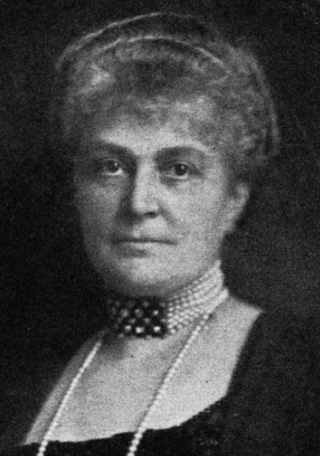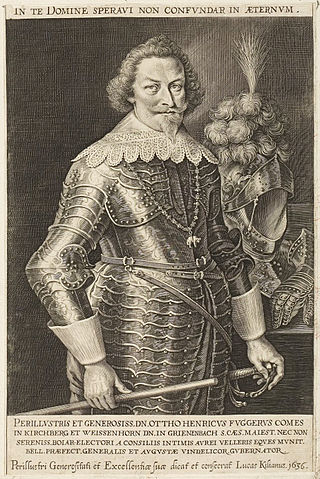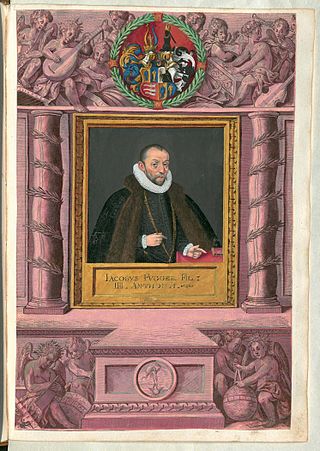
The House of Fugger is a German family that was historically a prominent group of European bankers, members of the fifteenth- and sixteenth-century mercantile patriciate of Augsburg, international mercantile bankers, and venture capitalists. Alongside the Welser family, the Fugger family controlled much of the European economy in the sixteenth century and accumulated enormous wealth. The Fuggers held a near monopoly on the European copper market.

The House of Fürstenberg was an influential Swabian noble family in Germany, based primarily in what is today southern Baden-Württemberg near the source of the Danube river. Numerous members of the family have risen to prominence over the centuries as soldiers, churchmen, diplomats, and academics. Sometimes the name is gallicized as de Furstenberg or anglicized as Furstenberg.

Illerkirchberg is a town in the district of Alb-Donau in Baden-Württemberg in Germany.

Charles II, Count of Hohenzollern-Sigmaringen(German: Karl II, Graf von Hohenzollern-Sigmaringen) became Count of Hohenzollern-Sigmaringen in 1576 and remained so until his death. He was the fifth but second surviving son of Charles I, Count of Hohenzollern, and Anna, daughter of Ernest, Margrave of Baden-Durlach.

Princess Eleonora Fugger von Babenhausen was an Austrian noblewoman, socialite and chronicler of the House of Fugger. She is also known as Nora Fugger in her autobiography.

Otto Heinrich Fugger, Count of Kirchberg and Weissenhorn was a German professional soldier in Imperial and Bavarian service during the Thirty Year's War. Born into the ennobled mercantile family Fugger, he chose a military career in which he became a Knight of the Golden Fleece and served as governor and military commander of Augsburg.

Georg Fuggervon der Lilie (1453–1506) was a German merchant of the Fugger dynasty.

Markus Fugger was a German politician and businessman of the Fugger family. He was the eldest son of Anton Fugger. He achieved several high offices - chamberlain to Archduke Ernest of Austria, Kammerpräsident, member of the kurbayrische (Bavarian) council, Pfleger (reeve) in the Landshut, and city-pfleger in Augsburg.
Anselm Maria Fürst Fugger von Babenhausen was a German nobleman of the Fugger family. He was the first reigning Count of the Principality of Babenhausen, in what is now the Landkreis Unterallgäu.

Maximilian Freiherr von und zu Trauttmansdorff, was an Austrian politician and diplomat of the Thirty Years' War era. His other titles included Freiherr von Gleichenberg, Neuenstadt am Kocher, Negau, Burgau und Totzenbach, Herr zu Teinitz. He was a Knight in the Order of the Golden Fleece, Geheimer Rat, Chancellor and Obersthofmeister.
Philipp IV of Hanau-Lichtenberg was from 1538 to 1590 the reigning Count of Hanau-Lichtenberg. Before his accession he had already conducted government business on behalf of his father, Count Philipp III. He was very interested in alchemy.

Count Christoph of Hohenzollern-Haigerloch was the first Count of Hohenzollern-Haigerloch.
Ambrosius Franz Friedrich Christian Adalbert von Virmont was a German nobleman and Imperial Count of Virmont and Bretzenheim.

Johann Jakob Fugger or Hans Jakob Fugger was a German banker and patron of the arts and sciences from the von der Lilie line of the noted Fugger banking family.

Jakob III. Fugger was a German businessman and landowner of the Fugger family. He was also Lord of Schloss Babenhausen in Unterallgäu.

Count John II of Waldeck-Landau, German: Johann II. Graf von Waldeck-Landau, official titles: Graf zu Waldeck und Pyrmont, Herr zu Tonna, was since 1638 Count of Waldeck-Landau. He served in the Swedish Army.

Karl Georg Ferdinand Jakob Maria, 5th Prince Fugger of Babenhausen was an Austrian landowner and officer. After serving in various Hussar regiments, he commanded the 3rd Hussar Regiment as Colonel during World War I. A member of the high nobility in the Kingdom of Bavaria as a Mediatized Sovereign Prince of the Empire, he was made chamberlain at the Viennese imperial court and from 1906 until his death, was the head of the House of Fugger-Babenhausen, Lord of Boos, Heimertingen, Wald, Wellenburg, Burgwalden, and Markt.

Georg Constantin Heinrich Carl Friedrich Maria Fugger von Babenhausen was the head of the House of Fugger-Babenhausen from 1925 to 1934.

Friedrich Carl Georg Maria Fugger von Babenhausen was the head of the House of Fugger-Babenhausen from 1934 to 1979, and formed Fürst Fugger Privatbank in 1954.
















